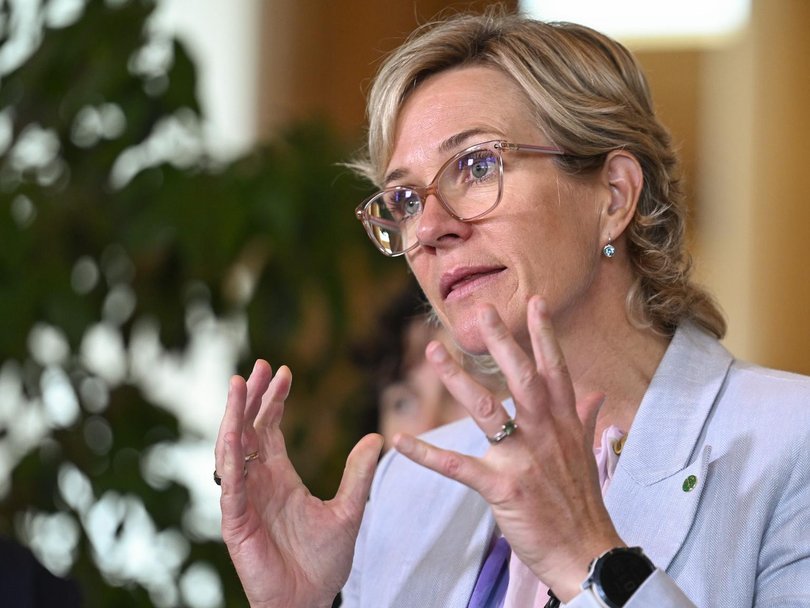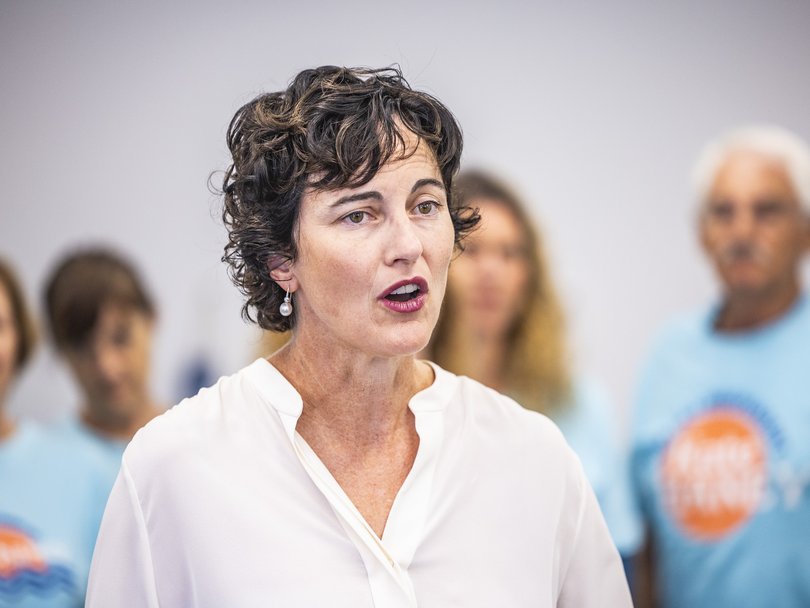Artificial Intelligence, sexual abuse material, deepfakes, scams in digital crosshairs of new crossbench
The Albanese Government has been urged to ‘get on with it’ and act on the rising risks of online harm.

Online sexual abuse material, child predators, deepfake bullying and deceptive advertising are in the crosshairs of Parliament’s newly formed crossbench.
The Federal Government is being urged to use its large mandate to tackle the risks of artificial intelligence which is increasingly being used to harm Australians — particularly children.
Warringah independent MP Zali Steggall and ACT Senator David Pocock on Monday introduced private members Bills in the Lower and Upper Houses to create “guardrails” against misleading political advertising and escalating risks posed by AI content and deepfakes.
Sign up to The Nightly's newsletters.
Get the first look at the digital newspaper, curated daily stories and breaking headlines delivered to your inbox.
By continuing you agree to our Terms and Privacy Policy.Separately, Kate Chaney, the independent member for Curtin, will attempt to legislate a new offence targeting emerging technologies designed to create, train or facilitate the production of child sexual abuse material, also including harmful deep fakes.
In both cases, crossbench MPs are urging the Government to plug gaps in legislation and to assuage public fears about the rapidly evolving technology.

The Albanese Government had introduced its own draft laws in the last term — the Electronic Communications Bill, also known as the “truth in political advertising” Bill — but failed to pass the reforms before the election.
The bills tabled by Ms Steggall and Mr Pocock mirror the previous attempt and call on the Government to reintroduce its own bill.
“We protect consumers against being scammed out of their money when it comes to misleading and deceptive advertising. We must do the same when it comes to politics,” said Ms Steggall on Monday.
“We cannot have a situation where our elections are hijacked by third party campaigners and bad faith actors who can put any level of misinformation out there.”
As the Government had indicated that it took time to legislate on these kinds of reforms, the crossbench had taken the first opportunity of the new term to start the process ahead of the 2028 poll, she said, welcoming a commitment by Special Minister of State Don Farrell, who oversees the Electoral Act, to meet and discuss the issue.
“Politicians shouldn’t be able to lie in elections, and the Labor Government knows that. That’s why they introduced a bill to stop lies in political advertising in last year, in the last term. They introduced it, shelved it, no debate, no mention of it,” said Senator Pocock.
“When it comes to truth in political advertising, they’ve gone missing in action, so the crossbench is introducing their bill saying, make good on your promise to the Australian people, protect our democracy,” he added.
“You have overwhelming support in this 48th parliament. Get on with it.”
Minister Farrell said he welcomed the views of “any Member or Senator genuinely interested in reforms that strengthen our democracy”, adding that Labor last term had introduced a proposal to address truth in political advertising and had invited feedback at that time.
He also pointed to the “world-leading package of electoral reform in the last parliament, to stop the influence of big money across our political system.”
“Those landmark reforms were the product of years of detailed policy work, committee inquiries, drafting, consultation, review, and debate,” he said.
Legislative reform on political advertising was previously recommended by the Joint Standing Committee on Electoral Matters, a parliamentary body specifically overseeing electoral laws and the practice of elections.
This committee has been reconvened for the current term.
It is understood the Government will be focussing on its newly passed electoral reform package, including caps on campaign spending and restrictions on big political donations.
Complex matters such as truth in political advertising are seen to require signification consideration.
The new bill proposed by independents would seek to ban misleading political advertising, grant more power to the Australian Electoral Commission to address complaints and also create a pathway to enforce retractions and corrections.
The new bill would seek to ban misleading political advertising, grant more power to the Australian Electoral Commission to address complaints and also create a pathway to enforce retractions and corrections.
The bill’s text flags the need to update laws to combat advances in “deepfake” visual and audio material targeting voters and attempting to undermine the integrity of democratic elections.
It points to examples in the United States, where a robocall used AI voice-clone technology to imitate former President Joe Biden telling voters not to vote in the primaries, and a deepfake video in the UK where then-Opposition leader Rishi Sunak was depicted making disparaging remarks about staff.
There was now an “international push” around electoral messaging reform, said Ms Steggall, referring to recent cases in New Zealand and Wales.
The alarming rise of deepfakes is an issue Kate Chaney is also seeking to curb in her own bill to make it an offence to download technology for creating child abuse material.

In response to a child safety roundtable hosted last week by the International Centre for Missing and Exploited Children, it would also make it an offence to collect, scrape or distribute data with the intention to train or create technology for creating child abuse material.
Ms Chaney said deepfakes, AI-generated child sexual abuse material and child-like AI personas that could be created by sophisticated tools were inundating law enforcement with more material.
“Right now, predators can access and download these sickening tools and train them to generate child sexual abuse material and then delete them before detection, to evade existing possession laws,” she said, explaining that the bill would limit the ability to create such material at scale.
“The technology landscape is changing at such a rapid rate — we need to be across advancements in AI to make sure the laws keep up with the tools offenders use to create this horrific material,” she said.
Ms Chaney said the bill aimed to close gaps in existing legislation.
Currently perpetrators could train AI tools to create material and delete images so that they could not be detected, normalising illegal material and making it harder for law enforcement to locate children at risk, she said.
“This is an issue that needs to be dealt with urgently. It has a relatively simple solution, and there should be an offence for downloading these particular tools,” said Ms Chaney, urging the Government to respond swiftly.
Dannielle Kelly, head of capacity and prevention at the ICMEC, said the legislation would make a small change to government process that would “allow police officers to actually put people away for this type of problem that all of us should be worried about.”

